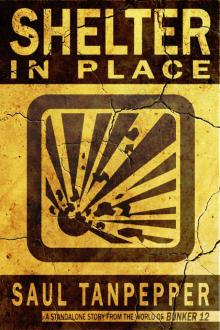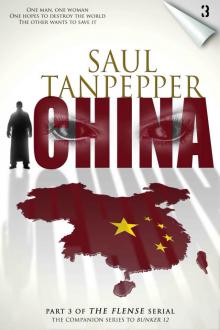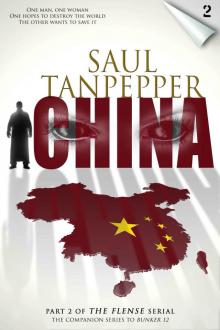- Home
- Saul Tanpepper
Iceland: An International Thriller (The Flense Book 2) Page 9
Iceland: An International Thriller (The Flense Book 2) Read online
Page 9
"They do not!" Angel said, appalled. Although there was a very thin thread of truth to what the woman said, she also knew that a single thread did not make the whole cloth. The protesters couldn't see that. The refugees weren't terrorists.
"They are brainwashed from birth," another man insisted. He waved a fist at the passing buses. "They hate the West. They hate freedom. They hate good Christian people!"
"They only want to live in peace and care for their children!" Angel said. "They want the same things you and I want."
"And I want them to leave!"
"Clear those tents," the soldier shouted. He lifted the radio in his hand to his mouth. "Send everything to be incinerated."
Incinerated?
Angel turned back. This wasn't the usual procedure. She had witnessed two decampments, and the migrants had always been allowed to pack all their belongings with them, including their tents. They'd also been relocated to other sites on commercial passenger buses with comfortable seats, treated with dignity, like human beings instead of animals or criminals. This was not the same. Something was different this time. Why did they need prison buses?
And why incinerate what was left behind?
It was too much like China again.
"Was there some kind of security threat?" she asked, probing. "There was, wasn't there? What was it?"
The guard turned and gave her a hard stare. The crowd around her hushed, eager to hear his response. "Stand back!" he shouted.
"They are terrorist!" the woman shouted at the top of her lungs in broken English. "I tell you this, no? I am right!"
The guard cocked an eyebrow at her and shook his head and shrugged. At last he walked over to Angel. "They are being taken away to be processed."
"You're lying. Where are they going?"
"Lying?" His face reddened. She could tell his patience was sorely strained. "I told you they're being relocated. That is all you need to know."
"Where?" she demanded.
He shrugged.
"I want to go with them."
"On the buses? Impossible."
"Who cares where they take them?" someone in the crowd shouted. "They don't belong here."
"They're here because they have no homes!" Angel yelled back. She was close to tears with the seeming futility of it all.
"And Paris is no home for them," the man replied with a sneer. "Haven't we already paid a price? How many people have to die before we get rid of them all?"
"You don't understand—"
"I understand. They are dirty, lazy, and smelly. They bring disease and hateful ideas. They only wish to do us harm, to kill us. That is all there is to understand."
"That is not true!" She turned to the guard. "Please, tell them!"
But he didn't. He shrugged, spun on his heels, and marched away, barking something out to his fellow soldiers. They laughed. The sound was harsh to Angel's ears.
"They are nothing like that!" she shouted. "They are human beings, just like you and I!"
"They are terrorists!" another woman in the crowd spat. She was young, pretty, but the sneer on her face twisted it into something ugly. Her words were met with cheers. A chant rose and quickly spread through the crowd.
Angel whirled around to stare at them. But if she hoped to find others like herself who didn't think this way, who hadn't fallen victim to the paranoia, they didn't show themselves.
"Shame on you!" Angel screamed at them.
"Send them home! All of them! Put them in prison! Kill them all!"
The crowd surged toward her, arms raised, fists clenched. Their faces were red and distorted with rage. They pushed Angel against the railing, and the metal resisted, pressing hard against her back, awakening deep injuries. She cried out as the pain flared. The barrier tilted, and she began to lose her balance.
"Away!" the guards shouted. They pulled out their batons and raised them, compelling the protesters to move back. Some of the guards rushed the railing to stop it from falling over.
The pain in Angel's back swelled until she couldn't breathe. Her knees gave beneath her and she slipped. She tried to grab the person closest to her and pull herself up, but they pushed her hands away, pressing her down.
The guards held them back, for the most part ignoring the shouts. They only cared that the buses be allowed to pass through the makeshift gate.
Angel somehow managed to get back to her feet, though it was difficult to stand fully upright. Most of the people were already settling down again, but some of them were displeased and kept trying to rile the rest up. She knew she had to get away before they crushed her again.
Two more buses passed through the gate, spewing their diesel exhaust. Angel turned away to avoid it, then turned quickly back. Staring out from across the road where a second group of protesters were gathered was the woman from the pharmacy. Their eyes locked.
The crowd pressed against Angel, shoving her to the side. A cardboard sign blocked her view. She pushed it away, but the woman was gone, swallowed up in the mass of people.
The last bus exited, and when the road was clear, Angel tried to locate the nurse again, but the woman had disappeared.
The caravan made the sharp turn onto the main road and headed out over the bridge. Almost immediately, the crowd began to disperse. There was nothing more to see. Whatever threat the migrants had posed, whether real or perceived, was now gone.
Angel watched as the tractors finished scooping up the ruined tents and trash and deposited it all into the waiting dump trucks to be carted away and—
sterilized
—burned.
The guards were preparing to depart as well, gathering their kits and loading onto trucks. All except the one she'd spoken to earlier, the one who'd looked at her funny. He was just standing there watching her. She didn't like the look in his eyes.
She decided it was time to leave, but when she stepped away, he pointed and shouted at her to stop. When he started to run after her, she turned and fled.
Chapter Thirteen
"Mahdi?" she shouted into the phone, after the ringing stopped and the call connected. "Allô?"
She had run toward the Metro station searching for a taxi. They all seemed to have vanished. Her own vehicle was still five kilometers away at the hotel, and with each second that passed she could feel the buses drawing farther away from her. At least she knew where they were taking them: Roubaix.
"Mahdi, are you there?" she said into the phone, pressing it so tightly against her ear that it hurt. A couple people glanced over at her but continued on their way. A truck rumbled past.
There was only silence on the line.
"Mahdi Haddad?"
"Who is this? Why are you calling this phone?"
She stopped short. The voice on the other end of the line wasn't his.
"This is Angelique de l'Enfantine. I'm calling for Mahdi Haddad."
There were some rustling noises, and she heard a couple people talking. One of them sounded like Mahdi, but there was something different about the way he sounded.
"Yes, hello?"
"Mahdi, are you okay?"
A taxi passed her and she ran into the road to wave it down. A car behind her honked several times. The driver opened his window to shout obscenities and spit at her as he swerved to go around.
"Mahdi? Are you there? I cannot hear you."
She glanced down at the screen and saw that the call had disconnected.
"Merde!"
Almost immediately, the phone began to ring. The Caller ID showed Mahdi's number.
"Mahdi? Can you hear me? Are you on the bus?"
"Bus?"
"With the other people from the camp. Are you with them?"
"Yes. I am sorry. Very noisy here."
"You sound different," she said, even though he no longer did. Had it just been her imagination, or had he lost the accent before?
"It is the noise. I cannot hear well." The accent was definitely back. "You stop looking for Farid. My broth
er is here with me."
"With you? He came back?"
"Yes. You can go now, okay? Not to worry anymore."
She hesitated. "Listen," she said, her voice shaking, "I am glad, but I still want to help. Can you tell me where they are taking you? Where are—"
The line clicked off.
She stopped walking and stared at the screen. Something wasn't right. In fact, she had a terrible feeling that something was very wrong. Just before the call disconnected, she had heard something in the background. It wasn't the rumble and grind of the bus. It had been the sound of a man speaking, reminding travelers over a loudspeaker not to leave baggage unattended.
She fumbled the phone for a moment, swiping through her apps and not finding the one she was looking for right away. She passed it twice before going back and tapping it open. The tiny program worked by capturing and storing the location information of the last caller. It wasn't always reliable, and it depended on the other user having their location settings active.
She waited as the digital hourglass spun on her screen. Finally, it stopped and was replaced with a few lines of text. Most of it was just numbers, the identities of carriers and cell towers, she thought. At the bottom was the following:
LOCATION: IATA: IST; ICAO: LTBA (TR)
But she had no idea what it meant. She copied the text and pasted it into a search bar. The first seven hits all indicated the same location: Istanbul Atatürk Airport.
Her legs gave out and she slowly sank to the road, weak with dread. Mahdi had left the country. So why had he lied and told her he was on the bus?
And who was the man he had been with? Was it his brother Farid, as he had said?
She was only vaguely aware when another car screeched to a stop a few meters in front of her and the driver pounded on his horn. In a daze, she somehow managed to get back to her feet and stumble over to the sidewalk.
She sat down on a bench in front of a book shop. Her hand nestled in her lap with the device still in it. With shaking fingers, she entered Norstrom's number. The call connected, and there was a long pause before a beep. No message, no nothing. Just the tone. Was she supposed to talk?
"Norstrom? It is Angel. They have taken the refugees from the camp onto buses. I think they are heading north to Roubaix. It is a town near the border with Belgium. But—" She swallowed as the panic inside of her welled up. "I think you might be right about what we talked about last night. About the . . . the big thing you said might happen. One of the refugees — his name is Mahdi Haddad — I was helping him look for his brother. But he left the country. I fear he and his brother Farid might be planning to do something, something bad. Norstrom, I think he—"
The phone beeped, cutting her off. She immediately redialed, but it didn't connect. The attempt itself terminated after three seconds.
"Dammit, Norstrom!"
Her phone buzzed, but it wasn't him. She was surprised to see Mahdi's number on the screen again.
"Allô?"
"Angelique de l'Enfantine?"
With a sob of fear, she disconnected.
The phone vibrated again almost immediately. Again, it was Mahdi.
"Who are you?" she whispered at the buzzing phone. She accepted the call and tried to speak without shaking, but her voice was thin and weak. "What are you planning?"
She received only silence from the other end.
"What have you done? Tell me! Who are you?"
Still nothing.
The counter on her screen ticked away, hit thirty seconds, then stopped.
A cold chill swept over her. They were tracing her location.
She needed to get rid of the phone, immediately. She needed to get away.
You've figured out they're not who you thought they were. But they know who you are. They know that you know and now they are going to want to kill you.
She kept expecting the damn phone to ring again. She kept expecting a stranger or the man who called himself Mahdi Haddad to tell her they were watching her. To say they would find her.
You're being silly, paranoid.
Was she?
She closed her eyes and drew her legs up to her chest. She wished she could just wake up from this terrible nightmare.
* * *
You have to go, the voice told her. Now, Angel! Get up! You can't just sit there waiting for them to find you!
She stood up. She started to walk. She didn't know how long she'd been sitting on the bench. It might have been minutes; it could have been hours. The sun in the sky was no help. Leaves fell from the trees, brushing her cheek, settling to the ground at her feet.
She reached into her pocket for the phone and found that she didn't have it.
You threw it away.
Had she? She couldn't remember doing it. It would've been the smart thing to do, but her mind seemed to have shut down for a while. Without the phone, she felt naked, vulnerable. She felt disconnected from the world.
She walked aimlessly, no idea where she should go or even where she was. It looked like a residential neighborhood. The buildings were smaller, dingier, the streets narrower and more tree-lined, yards fenced in with knee-high decorative wire.
And here was a park, also small, surrounded by a wrought iron fence, hip-high this time, its shiny black paint bubbled from a century-and-a-half of corrosion.
She kept going.
It was all wrong. She had come to Paris to help the refugees, to give them a voice when they had none. She'd come hoping to escape the nightmares plaguing her for the past five months, only to find herself plunged right back into the middle of it all again.
This time, however, she knew she couldn't escape. She could try to run, but to where? They would always find her, sooner or later, the company. The nanites. The man in silver and black. Because, if they were here, then they were everywhere.
They were everyone.
She stopped, and a woman walking a baby in a stroller nodded at her as she passed. Angel peered around her, noticing for the first time all the people on the sidewalks. Most were women, either young and with children, or old with their little wired shopping carts, heading to market or returning. A man stood on the corner smoking. His gazed swept past her without recognition, as if she were invisible. But he didn't look like he belonged.
Average build. Middle aged. Unremarkable street clothes. Forgettable appearance.
She couldn't see the man's face behind the cloud of smoke. He turned away from her before it cleared.
Cars passed all around them, speeding up and down the narrow roads, the drivers racing to make the next light. In the distance, a church bell rang. She smelled a wood fire burning. Children in fall coats chased each other in the park, screaming with glee, knit caps falling from their heads to the leaf-strewn ground. The picture of normalcy.
Except for the man. He didn't belong. He was one of them.
They all were, the woman with the baby and the other one with the cart . . . the couple sitting on the bench . . . and the kids.
And the man.
A car screeched to a stop at the curb beside her, startling her. The window opened.
"Get in the car," a man shouted at her. "Now!"
Chapter Fourteen
"Padraig?" she said, as she slid into the empty back seat. "Where's Norstrom?"
He held up a hand to quiet her. "Yes, sir," he said. "I've got her."
As soon as her door was shut, he pulled away from the curb, sticking his other arm out the window to warn another driver not to go around him.
"Yes," he said. "We're heading to Dieppe now."
"Are you taking me to see Norstrom?"
He continued to ignore her. "No safehouse? Are you sure? Yes, I understand, but Norstrom was very clear about her not getting involved. No, nothing yet." There was a longer pause. Then: "Yes, sir. I'll redirect. Let them know they should expect us sometime between four and four-thirty, then."
"How did you find me, Padraig?" Angel asked, leaning forward. "What is happening?"<
br />
This time, he deflected her questions with a curt shake of his head. Then, as if in afterthought, he turned stiffly around in the seat and whispered for her cell phone. That's when she saw the earpiece. When she told him she didn't have it, that she had thrown it away, he gestured again. "I know you've got it. That's how I found you. Give it up."
"But—"
"Your bag. Give me your bag."
She reached in and fished around, digging past her wallet, past the small handgun. There, at the bottom, was the offending object. Why hadn't she checked there before?
And why had she been so sure she'd gotten rid of it?
Padraig's fingers waggled impatiently. She dropped the phone into his palm, and he deftly removed the back and slipped out the battery with one hand. His eyes never left the road, and his other hand remained on the steering wheel. He carried on the conversation without interruption, interjecting every so often with a grunt or a word or two. Using a fingernail, he blindly popped out the tiny SIM card.
They crossed the Seine, heading back into the city, and he opened the window and chucked the separated pieces into the river below, confirming Angel's fears.
"Where is Norstrom?" she asked again.
"He's . . . okay. Don't worry."
She thought she detected something in the man's voice, maybe uncertainty or evasion, although it might have been the distraction of driving or the conversation she couldn't hear.
He continued on, effortlessly weaving in and out of traffic until she realized they were leaving Paris once again, this time from the west. She was lost and confused and realized that that was the point. He kept checking the rearview and side mirrors, as if he thought someone might be following.
She was able to glean little from his ongoing conversation, other than he knew about the evacuation of the refugee camp. In fact, it sounded as if it had been planned and executed at Norstrom's behest.
But other than for security reasons, she didn't hear what might have prompted him to order it.

 Open Wide
Open Wide Deep Into the Game: S.W. Tanpepper's GAMELAND (Episode 1) (Volume 1) (S. W. Tanpepper's GAMELAND)
Deep Into the Game: S.W. Tanpepper's GAMELAND (Episode 1) (Volume 1) (S. W. Tanpepper's GAMELAND) Shelter in Place: A short story from the world of BUNKER 12
Shelter in Place: A short story from the world of BUNKER 12 Iceland: An International Thriller (The Flense Book 2)
Iceland: An International Thriller (The Flense Book 2) GAMELAND Episodes 1-2: Deep Into the Game + Failsafe (S. W. Tanpepper's GAMELAND)
GAMELAND Episodes 1-2: Deep Into the Game + Failsafe (S. W. Tanpepper's GAMELAND) THE FLENSE: China: (Part 1 of THE FLENSE serial)
THE FLENSE: China: (Part 1 of THE FLENSE serial) S.W. Tanpepper's GAMELAND, Season One Omnibus
S.W. Tanpepper's GAMELAND, Season One Omnibus Golgotha: Prequel to S.W. Tanpepper's GAMELAND series (S. W. Tanpepper's GAMELAND companion title Book 1)
Golgotha: Prequel to S.W. Tanpepper's GAMELAND series (S. W. Tanpepper's GAMELAND companion title Book 1) THE FLENSE: China: (Part 3 of THE FLENSE serial)
THE FLENSE: China: (Part 3 of THE FLENSE serial) Leviathan: A Short Story About the End of the World
Leviathan: A Short Story About the End of the World Insomnia: Paranormal Tales, Science Fiction, & Horror
Insomnia: Paranormal Tales, Science Fiction, & Horror Velveteen
Velveteen THE FLENSE: China: (Part 2 of THE FLENSE serial)
THE FLENSE: China: (Part 2 of THE FLENSE serial) Deadman's Switch & Sunder the Hollow Ones
Deadman's Switch & Sunder the Hollow Ones